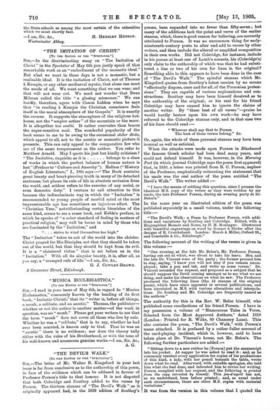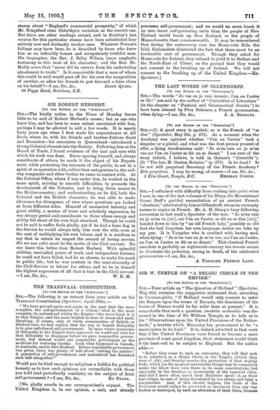"THE DEVIL'S WALK."
[To THB EDITOR OF THE "Sesersron.7] SIR,—The letter of Mr. Walter B. Kingsford in your last issue is far from conclusive as to the authorship of this poem, in face of the evidence which can be adduced in favour of Professor Porson's title to that honour. It is not disputed that both Coleridge and Southey added to the verses by Porson. The thirteen stanzas of "The Devil's Walk" as it originally appeared had, in the 1838 edition of Southey's
poems, been expanded into no fewer than fifty-seven ; but many of the additions lack the point and verve of the earlier stanzas, which, there is good reason for believing, are correctly attributed to Porson. It was no uncommon thing for early- nineteenth-century poets to alter and add to verses by other writers, and then include the altered or amplified composition in their own works. Did not Coleridge, for instance, include in his poems at least one of Lamb's sonnets, his (Coleridge's) only claim to the authorship of which was that he had substi- tuted a line or two of his own for lines in the original? Something akin to this appears to have been done in the case of "The Devil's Walk." The spiteful stanzas which Mr. Kingsford quotes from Southey's latest version by no means "effectually dispose, once and for all, of the Porsonian preten- sions." They are capable of various explanations and con- structions. Southey may have been himself deceived as to the authorship of the original; or his zeal for his friend Coleridge may have caused him to ignore the claims of another writer. By "these best of all verses "—praise he would hardly bestow upon his own work—he may have referred to the Coleridge stanzas only, and in that case two of his lines should read :— "Whoever shall say that to Person
The best of these verses belong," &c.
Or, again, the whole of these personal stanzas may have been ironical as well as satiric,al.
When the attacks were made upon Porson in Blackwood the famous Greek scholar had been dead many years, and could not defend himself. It was, however, in the Morning Post (in which journal Coleridge says the poem first appeared) that, in 1830, a letter was printed from R. C. Porson, nephew of the Professor, emphatically reiterating the statement that his uncle was the real author of the poem entitled "The Devil's Walk." The writer added :—
" I have the means of settling this question, since I possess the identical M.S. copy of the verses as they were written by my uncle, the late Professor Person, during an evening party at Dr. Beloe's."
In the same year an illustrated edition of the poem was published separately in a small volume, under the following title :—
" The Devil's Walk: a Poem by Professor Person, with addi- tions and variations by Southey and Coleridge. Edited, with a Biographical Memoir and Notes, by H. M. Montague. Illustrated with beautiful engravings on wood by Bonner & Slader after the designs of H. Cruickshank. London: Marsh & Miller, Oxford St., and Constable & Co., Edinburgh."
The following account of the writing of the verses is given in this volume :—
"One evening, at the late Mr. Beloe's, Mr. Professor Porson, having cut out at whist, was about to take his leave. Mrs. and the late Dr. Vincent were of the party ; the former pressed him to stay, saying, I know you will not stay if you remain unem- ployed; take a pen and ink, and write us some verses.' Dr. Vincent seconded the request, and proposed as a subject that he should suppose the Devil coming amongst us to see what we are doing, and make his observations on what he saw. The Professor produced the following lines (the 13 stanzas of the original poem), which have since appeared in several publications, and been circulated in M.S. with various alterations and interpola- tions. Dr. Southey and Mr. Coleridge are frequently named as the authors."
The authority for this is the Rev. W. Beloe himself, who published some recollections of his friend Porson. I have in my possession a volume of " Humourous Tales in Verse, Selected from the Most Approved Authors," dated 1818 (London : Printed for R. Wilke, 89 Chancery Lane). This also contains the poem, "The Devil's Walk," with Porson's name attached. It is prefaced by a rather fuller account of the card-playing incident, which is, however, said to have taken place at Dr. Vincent's house, not Mr. Beloe's. The following further particulars are added
Sitting down to a new rubber he [Person] put the manuscript into hie pocket. At supper he was asked to read it : and, as he commonly resisted every application for copies of his productions of this kind, a lady, with her pencil beneath the table, wrote down what he read. Afterward, with suitable apologies, she told him what she had done, and intreated him to revise her writing. Person complied with her request, and the following is printed from the copy corrected by himself. This jeu-d'esprit has not, as we understand, been before printed ; and, as usual under such circumstances, there are other M.S. copies with material variations." stanza about "England's commercial prosperity," of which Mr. Kingsford cites Coleridge's variation as the correct one. But there are other readings extant, and in Southey's last version for this particular stanza have been substituted four entirely new and distinctly weaker ones. Whatever Porson's failings may have been, he is described by those who knew him as an inflexibly honest and scrupulously truthful man. His biographer, the Rev. J. Selby Wilson, bears emphatic testimony to this trait of his character; and the Rev. Dr. Malby avers that "never did he swerve from his undeviating attachment to truth." Is it conceivable that a man of whom this could be said would pass off for his own the composition of another, or allow his friends to put forward a false claim







































 Previous page
Previous page